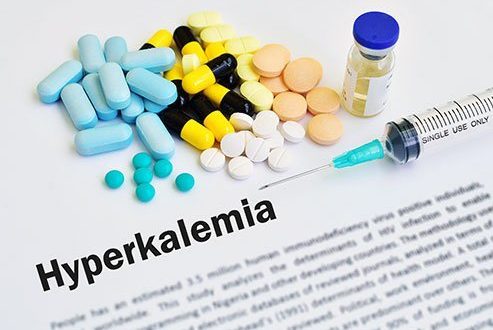Hyperkalemia occurs when you have too much potassium in your blood. Because hyperkalemia is a sign that something else is going on in your body, treatment depends on what’s causing it and whether the level of potassium in your blood is judged to be an emergency or not. Methods of treatments may include intravenous therapies, dialysis, diuretics, potassium-removing agents, albuterol, and diet modification. But before getting into its diagnosis and therapies along with diet modifications recommended by nurses and doctors, let’s get a better understanding of Hyperkalemia and its causes.
What is Hyperkalemia?
High potassium (called ‘hyperkalemia’) is a medical problem in which you have too much potassium in your blood. Your body needs potassium. It is an important nutrient that is found in many of the foods you eat. Potassium helps your nerves and muscles, including your heart, work the right way. But too much potassium in your blood can be dangerous. It can cause serious heart problems.
Causes of Hyperkalemia:
The most common causes include:
- Kidney disease: Hyperkalemia can happen if your kidneys do not work well. It is the job of the kidneys to balance the amount of potassium taken in with the amount lost in the urine. Potassium is taken through the foods you eat and the liquids you drink. It is filtered by the kidneys and lost through the urine. In the early stages of kidney disease, the kidneys can often make up for high potassium. But as kidney function gets worse, they may not be able to remove potassium from your body. Advanced kidney disease is a common cause of hyperkalemia.
- A Diet high in potassium: Eating too much food that is high in potassium can also cause hyperkalemia, especially in people with advanced kidney disease. Foods such as cantaloupe, honeydew melon, orange juice, and bananas are high in potassium.
- Drugs that prevent the kidneys from losing enough potassium: Some drugs can keep your kidneys from removing enough potassium. This can cause potassium levels to rise.
Other less common causes include:
- Taking extra potassium, such as salt substitutes or supplements.
- A disorder called “Addisons disease”, which can occur if your body does not make enough of certain hormones. Hormones are chemicals produced by different glands and organs, including the kidneys, to trigger certain responses in your blood.
- Poorly controlled diabetes.
- When diabetes is not controlled, it has a direct effect on your kidneys which are responsible for balancing potassium in your body.
Nursing diagnosis:
- Weakness, fatigue
- Risk of adverse cardiac events
- Inadequate urine output
- Palpitations
- Fluid retentions due to renal dysfunction
- Anxiety
Risk factors:

Hyperkalemia is unusual in the general population, reported in less than 5% of the population, worldwide, but may affect up to 10% of all hospitalized patients. Most cases in hospitalized patients reduce to medications and renal insufficiency. Diabetes, malignancy, extremes of age, and acidosis are other important causes in inpatients. Hyperkalemia is rare in children but may occur in up to 50% of premature infants. Hyperkalemia is more commonly reported in men than women perhaps due to increased muscle mass and higher rates of rhabdomyolysis and increased prevalence of the neuromuscular disease.
Potassium and Foods:
Your doctor or nurse may want you to make changes to the food you eat so potassium doesn’t build up in your blood because you have hyperkalemia. Often, that means cutting back on potassium. Healthy adults need about 2,600 to 3,400 milligrams of potassium each day. Someone on a potassium-restricted diet might only be allowed about 2.000 milligrams per day. Someone on a potassium-restricted diet might only be allowed about 2,000 milligrams per day. Potassium is many foods. Some fruits, vegetables, and legumes have a lot of it. It is also in dairy, meat, fish, and chicken. Your doctor or nurse will likely recommend that you focus on fruits and vegetables that are lower in potassium and limit portion sizes if you eat food rich in potassium. The goal is to find a balance because getting too little potassium can also cause problems.
How can I keep my potassium level from getting too high?
- You should limit foods that are high in potassium. Your dietitian or nutritionist will help you plan your diet so you are getting the right amount of potassium.
- Eat a variety of foods but in moderation.
- If you want to include some high potassium vegetables in your diet, leach them before using them. Leaching is a process by which some potassium can be pulled out of the vegetable. Check with your dietitian on the amount of leached high potassium vegetables that can safely include in your diet.
- Do not drink or use the liquid from canned fruits and vegetables, or the juices from cooked meat.
- Remember that almost all foods have some potassium. The size of the serving is very important. A large amount of low potassium food can turn into a high potassium food.
- If you are on dialysis, be sure to get all the treatment or exchange prescribed to you by the nurse or doctor.
Foods low in potassium that your nurse/ doctor can recommend:
The following list shows the foods low in potassium. A portion is a ½ cup, eating more than 1 portion can make a lower potassium food into a higher potassium food.
Fruits:
- Apple, apple juice, applesauce
- Apricots, canned in juice
- Blackberries, Blueberries, cherries
- Cranberries
- Grapes, Grape juice, grapefruit
- Mandarin oranges, peaches, pears
- Pineapple and pineapple juice
- Plums
- Raspberries, Strawberries
- Tangerines and Watermelon
Vegetables:
- Alfalfa sprouts, asparagus, beans, broccoli
- Cabbage, carrots, cauliflower, celery
- Cucumber, eggplant, kale, lettuce
- Onions, parsley, peas, peppers
- Radish, yellow, and zucchini squash
Other foods:
- Rice
- Noodles
- Pasta
- Bread and bread products
- Cake, coffee, pies (without chocolate)
- Cookies without nuts
- Tea (limited)
Lowering your intake of potassium by using a low potassium diet will help you recover from your Hyperkalemia. Your healthcare provider, nurse or doctor, may recommend you some foods or ask you to work with a dietitian to help you plan your diet.
 Nursing Trends
Nursing Trends







